Unit 3 The Million Pound Bank Note Language study课件
文档属性
| 名称 | Unit 3 The Million Pound Bank Note Language study课件 |  | |
| 格式 | zip | ||
| 文件大小 | 371.9KB | ||
| 资源类型 | 教案 | ||
| 版本资源 | 人教版(新课程标准) | ||
| 科目 | 英语 | ||
| 更新时间 | 2013-05-05 21:48:24 | ||
图片预览


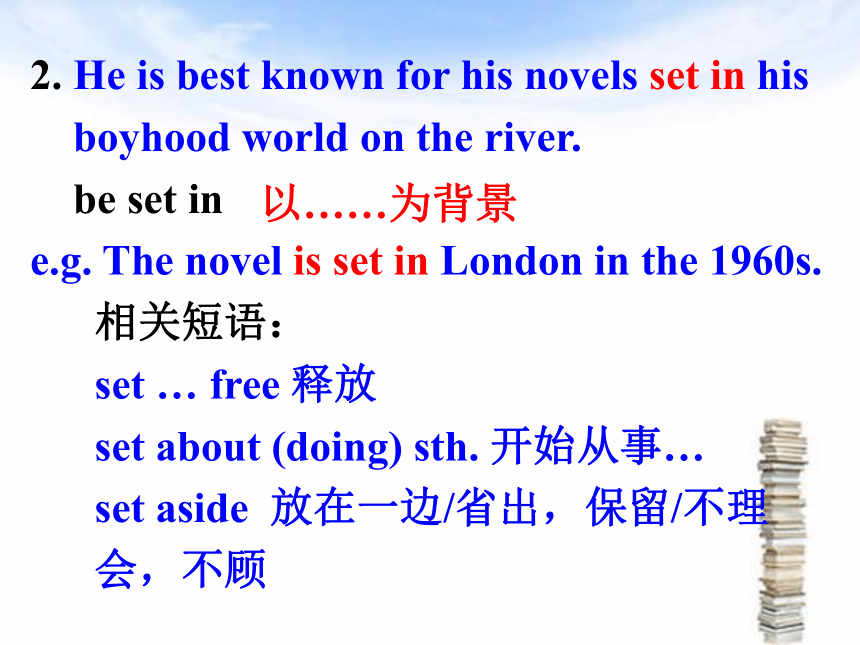
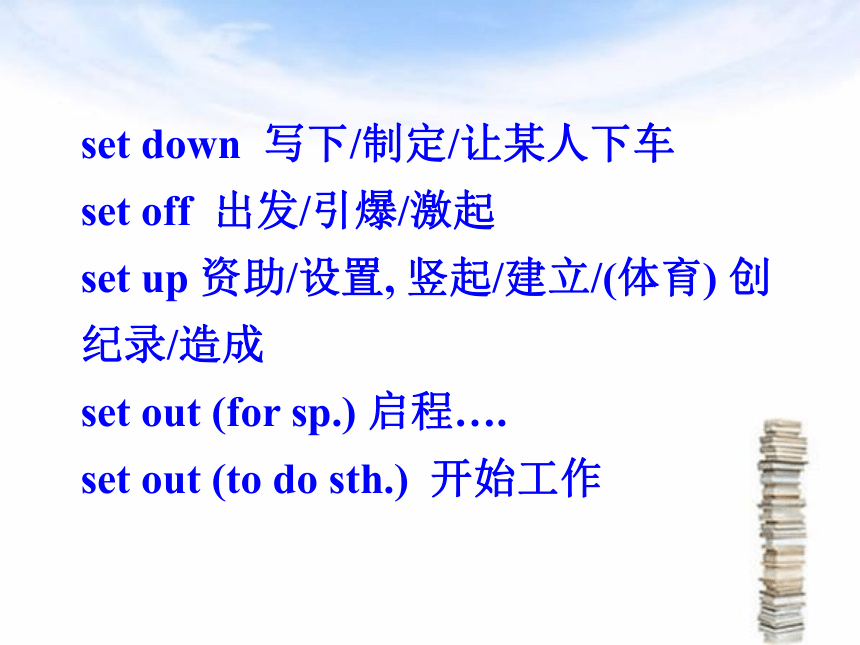
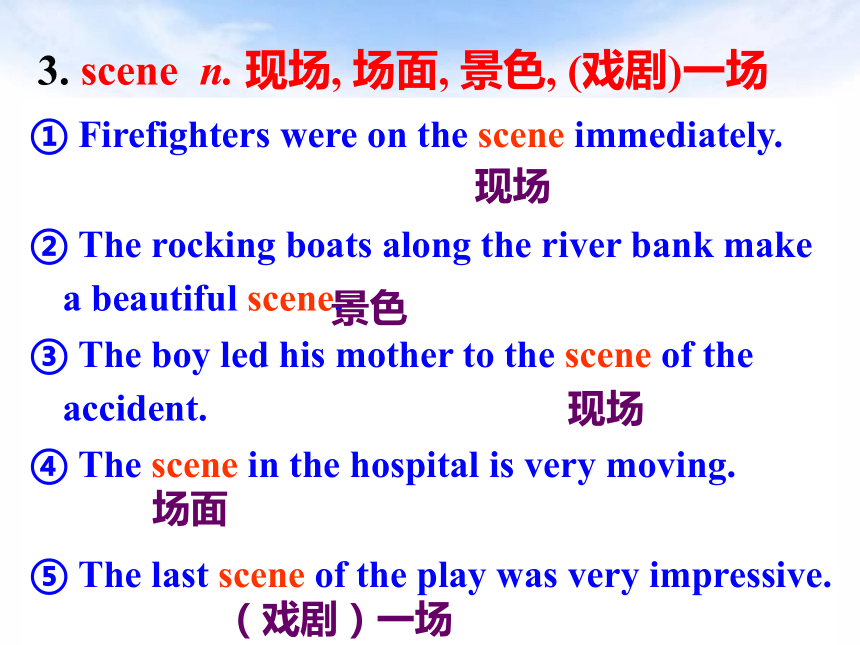
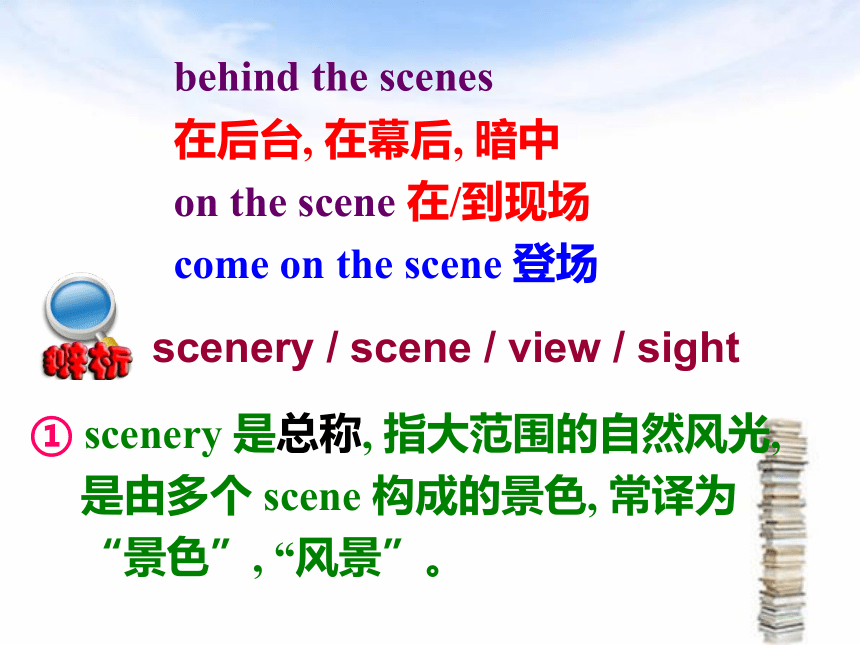
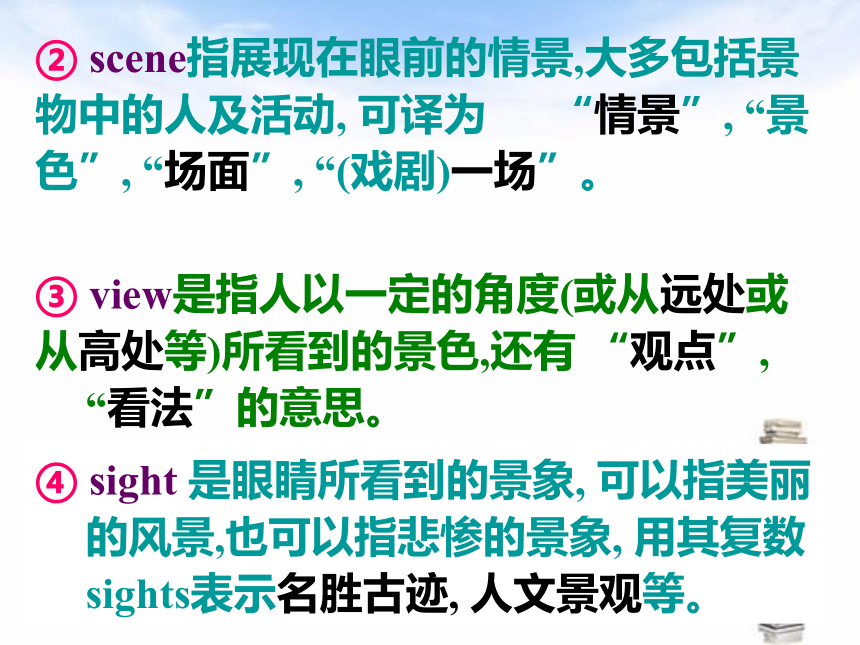

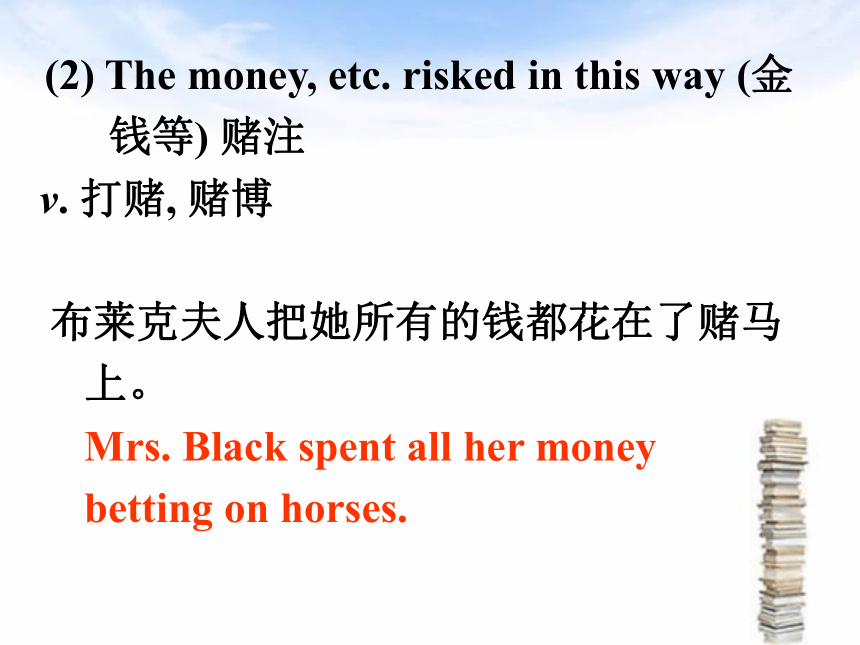
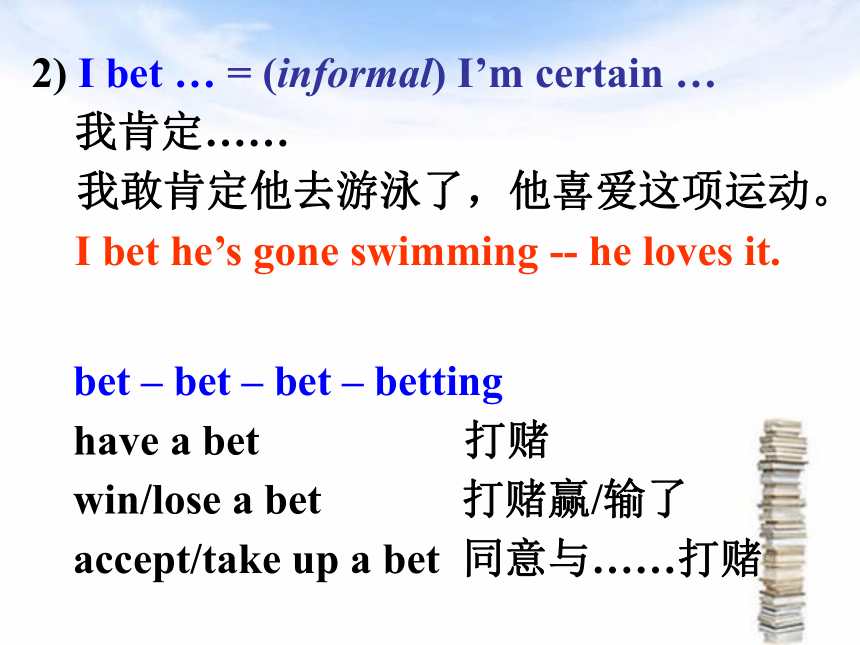

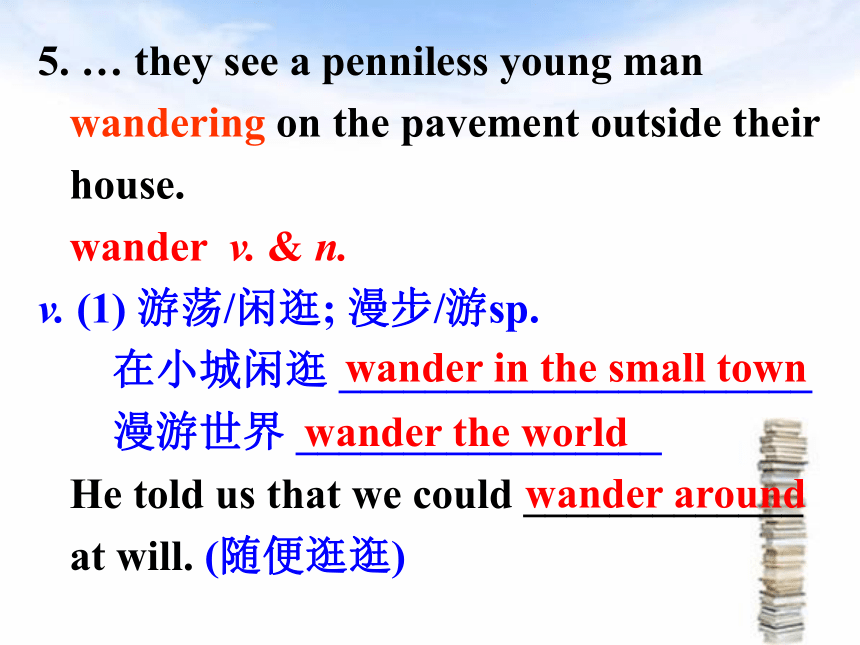
文档简介
课件48张PPT。Language
pointsUnit 3 The Million Pound Bank Note1. He was brought up in Hannibal.
bring up 抚养/养育,提出,呕吐
bring sth. along 带来
bring back 拿回来
bring in 产生
bring about 引起2. He is best known for his novels set in his
boyhood world on the river.
be set in
e.g. The novel is set in London in the 1960s.
相关短语:
set … free 释放
set about (doing) sth. 开始从事…
set aside 放在一边/省出,保留/不理
会,不顾以……为背景 set down 写下/制定/让某人下车
set off 出发/引爆/激起
set up 资助/设置, 竖起/建立/(体育) 创纪录/造成
set out (for sp.) 启程….
set out (to do sth.) 开始工作3. scene n. 现场, 场面, 景色, (戏剧)一场① Firefighters were on the scene immediately.
② The rocking boats along the river bank make a beautiful scene.
③ The boy led his mother to the scene of the accident.
④ The scene in the hospital is very moving.
⑤ The last scene of the play was very impressive.
现场景色现场场面(戏剧)一场behind the scenes
在后台, 在幕后, 暗中
on the scene 在/到现场
come on the scene 登场scenery / scene / view / sight ① scenery 是总称, 指大范围的自然风光, 是由多个 scene 构成的景色, 常译为 “景色”, “风景”。② scene指展现在眼前的情景,大多包括景物中的人及活动, 可译为 “情景”, “景色”, “场面”, “(戏剧)一场”。 ③ view是指人以一定的角度(或从远处或 从高处等)所看到的景色,还有 “观点”, “看法”的意思。④ sight 是眼睛所看到的景象, 可以指美丽 的风景,也可以指悲惨的景象, 用其复数 sights表示名胜古迹, 人文景观等。4. Roderick and Oliver have made a bet.
bet n.
(1) agreement to risk money, etc. on an event of which the result is doubtful赌博
make a bet 打赌
咱们赌下次大选好吗? Let’s make a bet on the next election.(2) The money, etc. risked in this way (金钱等) 赌注v. 打赌, 赌博
布莱克夫人把她所有的钱都花在了赌马上。 Mrs. Black spent all her money betting on horses. 2) I bet … = (informal) I’m certain …
我肯定……
我敢肯定他去游泳了,他喜爱这项运动。
I bet he’s gone swimming -- he loves it.bet – bet – bet – betting
have a bet 打赌
win/lose a bet 打赌赢/输了
accept/take up a bet 同意与……打赌bet sb. sth. 与某人打……的赌
bet on sth. 对某事打赌
make a bet on sth. with sb.
和某人在……上打赌
have a bet on … 在……上下赌注
do sth. for a bet 为打赌而做某事5. … they see a penniless young man wandering on the pavement outside their house.
wander v. & n.
v. (1) 游荡/闲逛; 漫步/游sp.
在小城闲逛 ______________________
漫游世界 _________________
He told us that we could _____________ at will. (随便逛逛)wander in the small townwander the worldwander aroundn. 漫游,闲逛
go for / take a wander 去溜达(2) 迷路,走失
The traveler wandered for some
time in the fog.
(3) 走神
My attention/mind wandered.6. Permit me to lead the way, sir.
permit (v.)
permit sb. to do sth.
= allow sb. to do sth. 允许
她的妈妈是不会允许她晚归的。
Her mother would not permit her to come back late.容我解释一下。
Permit me to explain it.2) permit sth.: allow sth. to exist, happen, or to be done (very formal) 许可、容许(某事物)存在、发生或被(某人)做(非常正式)
在我们的办公室里不准吸烟。
We don’t permit smoking in the office.
犯人每天允许有两个小时的户外活动。The prisoners were permitted two hours’ outdoor exercise a day.permit 的用法:
permit sth. / doing sth.
允许某事/干某事
permit sb. to do sth.
允许某人做某事
permit sb. sth.
允许某人做某事【即学即练】
根据汉语提示,用 permit 的适当形式完 成下列句子。
1. The use of mobile phones ______________ (不被允许) inside the aircraft.
2. ______________________________ (如果 时间允许的话), we will listen to your questions.is not permittedIf time permits / Time permittingmind doing
Did you mind being away from home for so long?
mind sb. doing sth.
Don't your parents mind you staying out so late?
not mind doing sth.
I don't mind driving if you're tired.
not mind what/who/where etc.不介意……
e. g. I don't mind where we go.
mindWould you mind if +句子(虚拟语气)
e. g. Would you mind if I opened the window?
Would you mind if I came with you?
Would you mind doing sth.?
请您做某事好吗?
Would you mind sb. / sb.’s doing sth.?
您介意某人做某事吗?
Would you mind waiting outside?
Would you mind my / me asking you a few questions?回答含有mind的疑问时:
表示“不介意”或“同意”时,常用否定形式:
No, of course not. / No, certainly not. / No, not at all. / No, go ahead. / No, do as you like. / No, indeed. / No, I don‘t mind. 等;
若表示“介意”或“不同意”时,则常用较委婉的方式加以拒绝:I'm sorry but I do. / Sorry, you'd better not. / I'm afraid you can't. / I wish you wouldn't ... / I'm sorry, but it's not allowed ...
7. go ahead: be carried out; take place 执行,进行,举行
1) 尽管天气不好,旅行将照常进行。 Despite the bad weather, the journey will go ahead.
新桥的修建将按计划进行。 The building of the new bridge will go ahead as planned.1. —Do you mind if I open the window?
—No, go ahead
—May I ask you a question?
—Yes, go ahead
2. If you want to leave, go right ahead.
3. You go ahead and we'll catch you up later.
go ahead of 走在某人前头
e. g. He stood back to let Sue go ahead of him.
尽管去做问吧一直走先走8. As a matter of fact, I landed Britain by
accident.
matter n. & v.
(1) n. affair, topic or situation being considered 事情;问题;情况
我不和同事谈私事。
I don’t discuss private matters with my colleagues.
下次会议我们有几件重要的事情要处理。We have several important matters to deal with at our next meeting.(2) n. 物质,材料,物品
宇宙是由物质构成的。
(3) v. be important 关系重大,要紧
他来也好去也好,那有什么关系呢?
你做什么我都无所谓。It doesn’t matter to me what you do.What does it matter whether he comes or goes?The universe is composed of matter.by accident = by chance
偶然地, 意外地
我只是碰巧找到的。
I only found it by accident. 9. His eyes stare at what is left of the brother’s dinner on table.
stare v.
(1) look at sb./sth. with the eyes wide open in a fixed gaze 瞪着眼睛凝视
盯着人看是没有礼貌的。 It’s rude to stare.
他们都惊讶得瞪大了眼睛。 They all stared in amazement.(2) be wide open with a fixed gaze 睁大眼睛注视
他瞪着眼睛注视着这场面。 He gazed at the scene with staring eyes.(3) bring sb. into a specified condition 瞪着某人使其做出某种反应
她把他瞪得不吭声了。 She stared him into silence.她凝视着远方。
She is staring into the distance.
我看了可是看不清楚。
I looked but couldn’t see it clear. what is left of … …中仅剩的
e. g. 1)They are fighting to save what is left of their business.
2) We must value what is left of the wildlife.
3) Don’t spend what is left of the money that he gave us.
4) He spend most of his time on his work and little was left of his energy.
towards + 时间名词 — just before a
particular time 即将……时
e. g. He came back home towards midnight.
We arrived at the hotel towards evening.
我们在将近黄昏的时候到达旅馆。
find + oneself + 宾补(-ing, -ed, adj., n. 介短等)
表示“发现”自己不知不觉地处于某种没料到的状态或处境 中
After wandering around, we found ourselves back at the hotel.
2) He found himself more and more interested in her.
1.He found himself walking in the direction
of the school.
1.他不知不觉地朝着学校走去。
2.Then he found himself surrounded by a group of boys.
2.他发现自己被一群男孩子围着。
3. Suddenly I found myself face to face with my boss.
3.突然我发现自己与我的老板面对面。10. I was spotted by a ship.
spot n. & v.
spotless adj. 没有污点的, 纯洁的
spotted adj. 有斑点的, 玷污的
(1) 斑点
Which has spots, the leopard or the tiger?(2)滴
Did you feel a few spots of rain?
(3) v. 找出, 认出, 发觉
Jack finally spotted just the shirt he wanted.
I can’t spot the difference between them.give somebody up for dead / lost etc — to believe that someone is dead and stop looking for them 认定某物已丢失而不找寻;认为某人没有生还的可能;不再抱有生还的希望
e. g. The ship sank and the crew were given up for dead.
After much searching, the village people gave Kay up for dead.
On the thirteenth day, she had given him up for lost.11. I earned my passage by working as an unpaid hand, which account for my appearance.
passage n. 船费(包括食宿)
Her grandfather had worked his
passage to America. 通道/通路,走廊
章节,段落 a passage from the Bible account for: be the explanation of sth.; explain the cause of sth. 做某事的解释;解释某事物的原因。
他因病缺席。 His illness accounts for his absence.
请你对自己的行为作出解释。 Please account for your own conduct.on account of
因为, 由于
take into account = take account of
考虑, 重视
on all accounts
无论如何
on no account
绝不 I’d ________ his reputation with other farmers and business people in the community, and then make a decision about whether or not to approve a loan.
take into account
B. account for
C. make up for
D. make outA弥补考虑说明……的原因理解,辨认出 appearance n.
arrival 出现,来到
警察突然出现, 小偷就逃跑了。 The sudden appearance of a policeman caused the thief to run away.
2) 外貌,外表
勿以貌取人——外貌不可靠。 Don’t judge by appearances ---- appearances can be misleading.…had just about done sth. when … (L.33)
几乎已经……这时……
just about — almost几乎
e. g.
1)An Arab was walking alone through the desert when he met two men.
2) I was wandering through the streets when I caught sight of a tailor's shop.
3)I had just fallen asleep, when the boor-bell rang.when 后面的分句常用非延续性动词的一般过去时,前面表背景的分句中:
1 背景行为先发生时用过去完成时
过去完成时和含否定意义的 hardly, scarcely, nearly 连用, “刚……,就……”
I had hardly opened the door when he hit me.
I had nearly reached the town, when the young man caught me.
I had been there little more than a week when I set to work.句型:
had hardly / scarcely / nearly done… when…
刚……就……2 背景行为正在进行中用过去进行时
I was cooking when I heard her knocking at the door.
2) He was thinking about the problem, when an apple fell to the ground.
当…..的时候背景行为还未开始时用
was /were going to, was / were about to, was / were on the point of
1) I was just going when he came in.
2)We were about to start when it began to rain.
3)He was on the point of leaving, when someone knocked at the door.这时候on the contrary /quite the contrary (用于否定陈述后) 恰恰相反
e. g.
1) It wasn't a good thing; on the contrary it was a huge mistake.
2) —I suppose your wife doesn't understand you.
—On the contrary, she understands me very well.
—Are they happy?
—No, no, quite the contrary.I’ll be on my way. 在途中
e. g. Six o’clock? Well, I should be on my way.
a) 就要到来/发生
There's a letter on its way to you. More changes are on the way.
b) 到某处;在去某地的途中
She should be on the way here by now.
on the/your/its way to
The ships were already on their way to the gulf.Homework 复习语言点
完成课本P20练习
完成同步练习2
预习Using languageThank you!
pointsUnit 3 The Million Pound Bank Note1. He was brought up in Hannibal.
bring up 抚养/养育,提出,呕吐
bring sth. along 带来
bring back 拿回来
bring in 产生
bring about 引起2. He is best known for his novels set in his
boyhood world on the river.
be set in
e.g. The novel is set in London in the 1960s.
相关短语:
set … free 释放
set about (doing) sth. 开始从事…
set aside 放在一边/省出,保留/不理
会,不顾以……为背景 set down 写下/制定/让某人下车
set off 出发/引爆/激起
set up 资助/设置, 竖起/建立/(体育) 创纪录/造成
set out (for sp.) 启程….
set out (to do sth.) 开始工作3. scene n. 现场, 场面, 景色, (戏剧)一场① Firefighters were on the scene immediately.
② The rocking boats along the river bank make a beautiful scene.
③ The boy led his mother to the scene of the accident.
④ The scene in the hospital is very moving.
⑤ The last scene of the play was very impressive.
现场景色现场场面(戏剧)一场behind the scenes
在后台, 在幕后, 暗中
on the scene 在/到现场
come on the scene 登场scenery / scene / view / sight ① scenery 是总称, 指大范围的自然风光, 是由多个 scene 构成的景色, 常译为 “景色”, “风景”。② scene指展现在眼前的情景,大多包括景物中的人及活动, 可译为 “情景”, “景色”, “场面”, “(戏剧)一场”。 ③ view是指人以一定的角度(或从远处或 从高处等)所看到的景色,还有 “观点”, “看法”的意思。④ sight 是眼睛所看到的景象, 可以指美丽 的风景,也可以指悲惨的景象, 用其复数 sights表示名胜古迹, 人文景观等。4. Roderick and Oliver have made a bet.
bet n.
(1) agreement to risk money, etc. on an event of which the result is doubtful赌博
make a bet 打赌
咱们赌下次大选好吗? Let’s make a bet on the next election.(2) The money, etc. risked in this way (金钱等) 赌注v. 打赌, 赌博
布莱克夫人把她所有的钱都花在了赌马上。 Mrs. Black spent all her money betting on horses. 2) I bet … = (informal) I’m certain …
我肯定……
我敢肯定他去游泳了,他喜爱这项运动。
I bet he’s gone swimming -- he loves it.bet – bet – bet – betting
have a bet 打赌
win/lose a bet 打赌赢/输了
accept/take up a bet 同意与……打赌bet sb. sth. 与某人打……的赌
bet on sth. 对某事打赌
make a bet on sth. with sb.
和某人在……上打赌
have a bet on … 在……上下赌注
do sth. for a bet 为打赌而做某事5. … they see a penniless young man wandering on the pavement outside their house.
wander v. & n.
v. (1) 游荡/闲逛; 漫步/游sp.
在小城闲逛 ______________________
漫游世界 _________________
He told us that we could _____________ at will. (随便逛逛)wander in the small townwander the worldwander aroundn. 漫游,闲逛
go for / take a wander 去溜达(2) 迷路,走失
The traveler wandered for some
time in the fog.
(3) 走神
My attention/mind wandered.6. Permit me to lead the way, sir.
permit (v.)
permit sb. to do sth.
= allow sb. to do sth. 允许
她的妈妈是不会允许她晚归的。
Her mother would not permit her to come back late.容我解释一下。
Permit me to explain it.2) permit sth.: allow sth. to exist, happen, or to be done (very formal) 许可、容许(某事物)存在、发生或被(某人)做(非常正式)
在我们的办公室里不准吸烟。
We don’t permit smoking in the office.
犯人每天允许有两个小时的户外活动。The prisoners were permitted two hours’ outdoor exercise a day.permit 的用法:
permit sth. / doing sth.
允许某事/干某事
permit sb. to do sth.
允许某人做某事
permit sb. sth.
允许某人做某事【即学即练】
根据汉语提示,用 permit 的适当形式完 成下列句子。
1. The use of mobile phones ______________ (不被允许) inside the aircraft.
2. ______________________________ (如果 时间允许的话), we will listen to your questions.is not permittedIf time permits / Time permittingmind doing
Did you mind being away from home for so long?
mind sb. doing sth.
Don't your parents mind you staying out so late?
not mind doing sth.
I don't mind driving if you're tired.
not mind what/who/where etc.不介意……
e. g. I don't mind where we go.
mindWould you mind if +句子(虚拟语气)
e. g. Would you mind if I opened the window?
Would you mind if I came with you?
Would you mind doing sth.?
请您做某事好吗?
Would you mind sb. / sb.’s doing sth.?
您介意某人做某事吗?
Would you mind waiting outside?
Would you mind my / me asking you a few questions?回答含有mind的疑问时:
表示“不介意”或“同意”时,常用否定形式:
No, of course not. / No, certainly not. / No, not at all. / No, go ahead. / No, do as you like. / No, indeed. / No, I don‘t mind. 等;
若表示“介意”或“不同意”时,则常用较委婉的方式加以拒绝:I'm sorry but I do. / Sorry, you'd better not. / I'm afraid you can't. / I wish you wouldn't ... / I'm sorry, but it's not allowed ...
7. go ahead: be carried out; take place 执行,进行,举行
1) 尽管天气不好,旅行将照常进行。 Despite the bad weather, the journey will go ahead.
新桥的修建将按计划进行。 The building of the new bridge will go ahead as planned.1. —Do you mind if I open the window?
—No, go ahead
—May I ask you a question?
—Yes, go ahead
2. If you want to leave, go right ahead.
3. You go ahead and we'll catch you up later.
go ahead of 走在某人前头
e. g. He stood back to let Sue go ahead of him.
尽管去做问吧一直走先走8. As a matter of fact, I landed Britain by
accident.
matter n. & v.
(1) n. affair, topic or situation being considered 事情;问题;情况
我不和同事谈私事。
I don’t discuss private matters with my colleagues.
下次会议我们有几件重要的事情要处理。We have several important matters to deal with at our next meeting.(2) n. 物质,材料,物品
宇宙是由物质构成的。
(3) v. be important 关系重大,要紧
他来也好去也好,那有什么关系呢?
你做什么我都无所谓。It doesn’t matter to me what you do.What does it matter whether he comes or goes?The universe is composed of matter.by accident = by chance
偶然地, 意外地
我只是碰巧找到的。
I only found it by accident. 9. His eyes stare at what is left of the brother’s dinner on table.
stare v.
(1) look at sb./sth. with the eyes wide open in a fixed gaze 瞪着眼睛凝视
盯着人看是没有礼貌的。 It’s rude to stare.
他们都惊讶得瞪大了眼睛。 They all stared in amazement.(2) be wide open with a fixed gaze 睁大眼睛注视
他瞪着眼睛注视着这场面。 He gazed at the scene with staring eyes.(3) bring sb. into a specified condition 瞪着某人使其做出某种反应
她把他瞪得不吭声了。 She stared him into silence.她凝视着远方。
She is staring into the distance.
我看了可是看不清楚。
I looked but couldn’t see it clear. what is left of … …中仅剩的
e. g. 1)They are fighting to save what is left of their business.
2) We must value what is left of the wildlife.
3) Don’t spend what is left of the money that he gave us.
4) He spend most of his time on his work and little was left of his energy.
towards + 时间名词 — just before a
particular time 即将……时
e. g. He came back home towards midnight.
We arrived at the hotel towards evening.
我们在将近黄昏的时候到达旅馆。
find + oneself + 宾补(-ing, -ed, adj., n. 介短等)
表示“发现”自己不知不觉地处于某种没料到的状态或处境 中
After wandering around, we found ourselves back at the hotel.
2) He found himself more and more interested in her.
1.He found himself walking in the direction
of the school.
1.他不知不觉地朝着学校走去。
2.Then he found himself surrounded by a group of boys.
2.他发现自己被一群男孩子围着。
3. Suddenly I found myself face to face with my boss.
3.突然我发现自己与我的老板面对面。10. I was spotted by a ship.
spot n. & v.
spotless adj. 没有污点的, 纯洁的
spotted adj. 有斑点的, 玷污的
(1) 斑点
Which has spots, the leopard or the tiger?(2)滴
Did you feel a few spots of rain?
(3) v. 找出, 认出, 发觉
Jack finally spotted just the shirt he wanted.
I can’t spot the difference between them.give somebody up for dead / lost etc — to believe that someone is dead and stop looking for them 认定某物已丢失而不找寻;认为某人没有生还的可能;不再抱有生还的希望
e. g. The ship sank and the crew were given up for dead.
After much searching, the village people gave Kay up for dead.
On the thirteenth day, she had given him up for lost.11. I earned my passage by working as an unpaid hand, which account for my appearance.
passage n. 船费(包括食宿)
Her grandfather had worked his
passage to America. 通道/通路,走廊
章节,段落 a passage from the Bible account for: be the explanation of sth.; explain the cause of sth. 做某事的解释;解释某事物的原因。
他因病缺席。 His illness accounts for his absence.
请你对自己的行为作出解释。 Please account for your own conduct.on account of
因为, 由于
take into account = take account of
考虑, 重视
on all accounts
无论如何
on no account
绝不 I’d ________ his reputation with other farmers and business people in the community, and then make a decision about whether or not to approve a loan.
take into account
B. account for
C. make up for
D. make outA弥补考虑说明……的原因理解,辨认出 appearance n.
arrival 出现,来到
警察突然出现, 小偷就逃跑了。 The sudden appearance of a policeman caused the thief to run away.
2) 外貌,外表
勿以貌取人——外貌不可靠。 Don’t judge by appearances ---- appearances can be misleading.…had just about done sth. when … (L.33)
几乎已经……这时……
just about — almost几乎
e. g.
1)An Arab was walking alone through the desert when he met two men.
2) I was wandering through the streets when I caught sight of a tailor's shop.
3)I had just fallen asleep, when the boor-bell rang.when 后面的分句常用非延续性动词的一般过去时,前面表背景的分句中:
1 背景行为先发生时用过去完成时
过去完成时和含否定意义的 hardly, scarcely, nearly 连用, “刚……,就……”
I had hardly opened the door when he hit me.
I had nearly reached the town, when the young man caught me.
I had been there little more than a week when I set to work.句型:
had hardly / scarcely / nearly done… when…
刚……就……2 背景行为正在进行中用过去进行时
I was cooking when I heard her knocking at the door.
2) He was thinking about the problem, when an apple fell to the ground.
当…..的时候背景行为还未开始时用
was /were going to, was / were about to, was / were on the point of
1) I was just going when he came in.
2)We were about to start when it began to rain.
3)He was on the point of leaving, when someone knocked at the door.这时候on the contrary /quite the contrary (用于否定陈述后) 恰恰相反
e. g.
1) It wasn't a good thing; on the contrary it was a huge mistake.
2) —I suppose your wife doesn't understand you.
—On the contrary, she understands me very well.
—Are they happy?
—No, no, quite the contrary.I’ll be on my way. 在途中
e. g. Six o’clock? Well, I should be on my way.
a) 就要到来/发生
There's a letter on its way to you. More changes are on the way.
b) 到某处;在去某地的途中
She should be on the way here by now.
on the/your/its way to
The ships were already on their way to the gulf.Homework 复习语言点
完成课本P20练习
完成同步练习2
预习Using languageThank you!
同课章节目录
